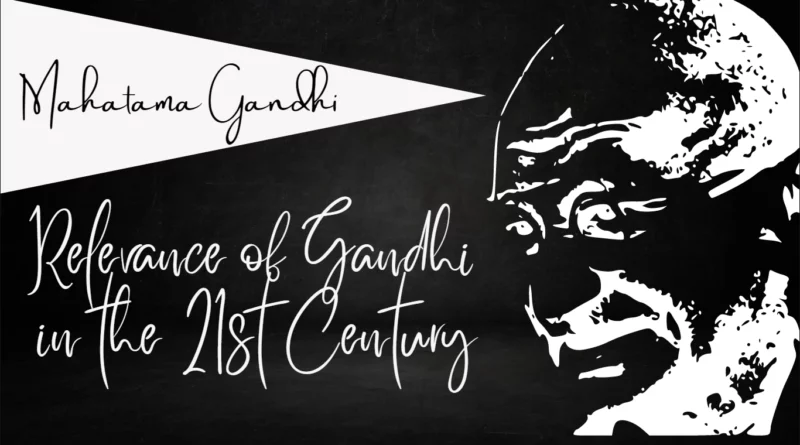Relevance of Gandhi in the 21st Century – Essay for UPSC
In this essay, we try to discuss what problems the world is facing today and the Relevance of Gandhi in the 21st Century. Moreover, what the modern-day Nations need to learn from Gandhiji. Further, we will cover the significance of the thoughts of Gandhi in the present time in the essay for UPSC.
Relevance of Gandhi in the 21st Century
A hundred years ago, in 1919, Mahatma Gandhi started the non-cooperation movement against brutal and exploitative British rule. That was the first mass movement against the British Empire which leads to the involvement of masses from various sections of society. It was because of the efforts of Gandhiji and his charismatic personality. That had encouraged and enthused millions of Indians against the foreign rule. Although, India got independence in 1947 but not on the terms Gandhiji Wanted.
Now, are going to celebrate 75 years of independence in 2022 and the 150th birth anniversary of Gandhiji in 2019. It is but obvious, to look at ourselves. To what extent India has been able to fulfill the dreams of our nation’s forefathers? Not the whole world, in today’s materialistic times, is grappling with serious political, social, economic, and security challenges. Various revolutions around the world for self-rule, terrorist attacks, food security, economic slowdown, increasing intolerance, and religious chauvinism are some of the many problems that the world is facing today.
Relevance of Gandhi in the 21st Century with the Cold War
It would be very interesting to know how the principles and values that Gandhiji thought would be relevant in solving the problems of the present-day world. Most of the Nations that were colonies of European powers got their Independence along with India during the 1940s-1950s. After that, the major challenges before the newly independent nations were to progress on the path of development. That would lead to social, political, and economic equality. While most of the European powers which faced a lot of setbacks started their reconstruction. The world saw the rise of two superpowers the USA and the USSR. Both superpowers are based on conflicting values. Hence, this led to cutthroat competition between the two powers on various fronts, which started the era of the cold war.
The cold war led to the origin of many more problems that the world is facing today. Though the cold war era has ended it led to a huge expansion in the nuclear field. In Modern Times, many nations are capable of nuclear strikes including the arch-rivals India and Pakistan. This has put the whole world on the verge of extinction if any nuclear war starts.
Resources by Nature & Conflict Among Nations
Competition among the Nations has also led to the over-exploitation of natural resources. Which would lead to the extinction of fossil fuels (Coal & Petroleum reserves). Our use of fossil fuels has led to a potential problem of energy security before the world. Further, fossil fuel when burnt releases carbon dioxide into the atmosphere. That increased the overall global temperature and severely affected the climate patterns. Depletion of the Ozone layer, melting of polar ice, the phenomenon of the Polar Vortex, frequent incidents of droughts & floods, and increasing sea levels. These are all consequences of the changing climate conditions due to the rampant use of fossil fuels.
Not only is this economic competition, but many nations are also facing border problems with their neighbors. which is constantly hampering their social-economic development. India-Pak and Israel-Palestine are some of the recent border issues. It shows the external security challenge for their countries and the imminent danger of war.
Moreover, with external problems, modern-day nations are also facing internal problems like internal security and societal upheaval. Further, there have been many “wolf attacks” in recent times like the USA mass shooting, the Christ Church attack in New Zealand, terrorist attack in Sri Lanka. It all shows that countries are facing a huge threat from their own internal security. Even in India, there have been many incidents of intolerance, hate speech, mob lynching, etc.
Further, Gandhiji said,” sufficient for everyone’s need but not everyone’s greed”. This principle when applied to the rampant exploitation of natural resources, will solve the problem of extinction as well as the threat of climate change. All countries must use their natural resources in the amount that is needed to sustain their population and not for blind economic progress.
Relevance of Gandhi in the 21st Century Politics
Further, politics have become corrupt and inefficient due to power-capturing culture and less accountability to people. Moreover, politicians are using the poor and innocent followers on the lines of religion, caste, and community only for their political gains. There has been a serious deficit of governance on many fronts. Poor policies and implementation, top-down approach, poor grievance redressal mechanism, and lack of sufficient growth and development drivers in rural areas lead to the dejection & discouragement of youth. Further, development in technology has also led to many more problems like fake news, cyber attacks, hacking, phishing, and digital fraud. This show that the world is facing a lot of problems.
Gandhiji has given the concept of seven sins in which we highlighted the basic things that every person should shun. It will solve the problem of our corrupt politics as Gandhiji called the “Politics without Principles” a sin. He considered religion as a personal trait of a person. Moreover, every person should not interfere in the personal space of other as well as also respects his religious sentiments. But people in today’s world have gone much more intolerant on religious lines and attacked each other.
Share: Relevance of Gandhi in the 21st Century
How Gandhiji and his Principles are Relevant in Today’s World
Gandhiji has always said that one should follow the path of truth and nonviolence, even to fight the strongest of enemies. According to Gandhiji, “An eye for an eye will make the whole World Blind”. Therefore, the war of hate and destruction can only be won by love and peace. This would be applicable to solve most of the ongoing disputes between many countries including India-Pakistan. Further, if countries adopted the path of peace and harmony and try to solve their issues through peaceful talk and discussions. Then there will be no need for nuclear weapons of mass destruction. As there would be no need for any war to solve the boundary dispute.
Gandhiji believed in the principle of self-rule. According to him, Swaraj means the “Gram Raj” where every village is self-sufficient in its own cause. Moreover, people have enough political, social, and, economic rights at the village level. But, the government seems to be more centralized in nature. Moreover, it reflects the socialist nature of its economy and the lack of self-rule and power to the people at the local level.
Gandhiji even also proclaimed that there should be technological and scientific advancement. But, it should lead to the overall development of mankind. Also claimed that “science without humanity” is one of the sins. Increasing economic and social inequality is also one of the phenomena of modern-day society. According to Gandhiji, all the rich people in the world should act as only the trustee of the wealth that they have accumulated. They should use it for the benefit of the people and the nation. Therefore, it can be seen that the principles and values of Gandhiji are even relevant today.
Share: Relevance of Gandhi in 21st Century
Wayforward: Relevance of Gandhi in the 21st Century
What we need today is to rejuvenate our principles and values in social, political, and economic contexts according to his teaching. The world needs to be more pragmatic about the development of nuclear weapons. rampant resource exploitation, increasing dangers of Climate Change, and border disputes. Which can be easily solved through the weapons of truth and nonviolence. Moreover, people also have a lot to learn from Gandhiji, all organizations, public offices, and institutions are run by the people. If people are good and have moral values, then the Institutions will automatically be efficient and effective. Hence, Gandhiji focuses on the personal moral values of a person and encourages him to shun the seven sins.
If you like the Relevance of Gandhi in the 21st Century, please share it with your friends. If you want to read a similar article click on the link below.
READ NEXT:- Essay for UPSC!

